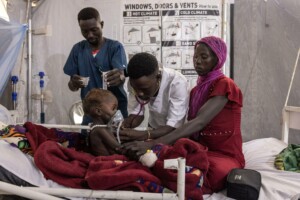Sudan OCHA bulletin 35: Aid organisations phasing out of Central Darfur
The Office for the Coordination of Humanitarian Affairs (OCHA) in Sudan reported in its bulletin this week that a number of aid organisations in Central Darfur are facing funding constraints and are phasing out.
Most of the children who died in Nierteti Hospital, Central Darfur, during the past weeks reportedly came from the areas of Thur and Golo in northern Jebel Marra.
The resumption of the activities of the International Committee of the Red Cross (ICRC) are taking longer than initially expected.
In West and Central Darfur, aid organisations have so far reached 97 percent of the 14,560 vulnerable families living in camps for the displaced.
The Office for the Coordination of Humanitarian Affairs (OCHA) in Sudan reported in its bulletin this week that a number of aid organisations in Central Darfur are facing funding constraints and are phasing out.
Most of the children who died in Nierteti Hospital, Central Darfur, during the past weeks reportedly came from the areas of Thur and Golo in northern Jebel Marra.
The resumption of the activities of the International Committee of the Red Cross (ICRC) are taking longer than initially expected.
In West and Central Darfur, aid organisations have so far reached 97 percent of the 14,560 vulnerable families living in camps for the displaced.
The international NGO Norwegian Church Aid is planning to close its office in Garsila town in Central Darfur’s Wadi Salih locality. It will subsequently hand over some of its programmes to local organisations and communities by the end of September.
In March, the international Catholic Relief Services phased out their water and sanitation programmes in Mukjar camp for the displaced and handed over operations to the government’s Department of Water and Sanitation (WES) and community leaders.
Aid organisations are concerned that the phasing out and scaling down of activities by international NGOs because of funding constraints will create large gaps in the provision of services to people in need in Central Darfur.
Children die of malnutrition in Darfur's Jebel Marra
Most parts of Jebel Marra remain inaccessible to humanitarian organisations after fighting earlier this year between government forces and rebel movements. The violence displaced tens of thousands of people.
There are serious concerns that the access restrictions by the Sudanese authorities will lead to an increase of severe acute malnutrition levels in the area. Most of the children who died in Nierteti Hospital, Central Darfur, during the past weeks reportedly came from the areas of Thur and Golo in northern Jebel Marra. More children could be dying before being able to access treatment.
Red Cross not yet fully operational in Sudan
Although the suspension of the International Committee of the Red Cross (ICRC) activities in Sudan was lifted at the end of 2014, and despite the fact that important quantities of aid were delivered in 2015, the organisation has not been able to fully resume its operations thus far.
Discussions with authorities in Sudan and the Red Cross' main partner, the Sudanese Red Crescent Society (SRCS), on the full resumption of ICRC activities are taking longer than initially expected.
Vulnerable families assisted in West, Central Darfur
Aid organisations have so far reached 97 percent of the 14,560 vulnerable families living in camps for the displaced in West and Central Darfur, who have been targeted for renewal of emergency shelter and household supplies.
According to the government’s Humanitarian Aid Commission, 155 families affected by heavy rains in the camps in El Geneina, capital of West Darfur, need assistance. In response, Help Age International and Catholic Relief Services conducted an assessment of their needs. Verifications are also conducted for people affected by torrents in the areas of West Darfur's Murnei, West Darfur, and Bindisi and Um Dukhun in Central Darfur.
Read the full bulletin here











 and then
and then